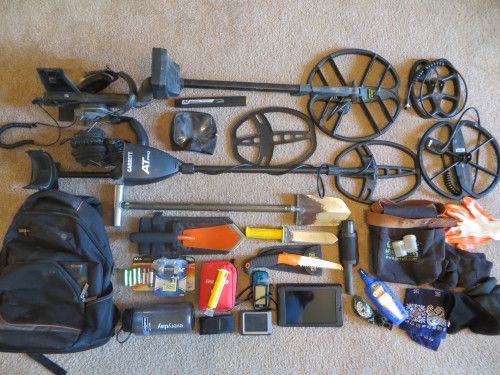Here’s a list of metal detecting equipment and tools to help you get started in the hobby:
Metal detector:
The most important tool in your arsenal is a quality metal detector. There are so many different brands and models to choose from it can be overwhelming. When choosing your first metal detector it’s very important that it come from one of the major brands that specializes in making detectors. Here’s a list of some major brands in no particular order:
Garrett
Whites
Minelab
Fisher
Tesoro
Bounty Hunter
Teknetics
XP Detectors
Blisstool
There are many other off brands available but they typically sell other electronics as well. Since they don’t specialize in making metal detectors their detectors are usually generic units imported from China with cheap quality and poor circuitry.
Shopping for a metal detector is like shopping for a car, there are many different options and everyone has their own brand loyalty. The following article will help you understand what to look for in a detector and how to shop for one effectively:
How to choose a metal detector
You might also want to check out some of our lists of top metal detectors for your particular needs:
Coil cover and headphones:
Some might consider these two items optional but most serious detectorists use both. Headphones help block out unwanted noise and also allow you to hear faint signals much better. By focusing on the audio signals you’ll typically be able to hear deeper targets with less audio interruption. This is especially the case when hunting in the city with noisy cars and in the fall when there are dry leaves on the ground which create a lot of noise.
A coil cover is simply a thin piece of plastic that goes over your metal detectors coil. Some metal detectors don’t come with one but they can usually be purchased as an accessory. To achieve the maximum depth out of your detector it’s a good idea to run the coil directly on the ground so a coil cover is essential to protect it.
Digging tool:
Once you get a good signal you’ll need a way to get the object out of the ground. Most detectorists use either a hand digger or a small spade shovel for cutting their plugs. The average plug you’ll need to dig should be from an inch or two down to about 10″ so a full size shovel is typically not needed. One of the well known brands for making high quality digging tools is Predator tools (also known as Lesche).
Drop cloth or handkerchief:
It’s always a good idea to leave the property as good or better than it was before you got there. By using a drop cloth you can remove soil from the hole and then put it back easily instead of leaving a mess on the grass.
Finds pouch:
A finds pouch is where you put your trash finds as well as good finds. When detecting it’s common courtesy to remove all trash items so the next time you or another detectorists goes over the area it doesn’t get detected again. A good finds pouch will have a large area for storing trash items and a small usually zippered are for keeping your good finds. A belt with a quick disconnect is also handy for taking it on and off quickly.
Gloves:
I’ve come across some pretty nasty objects while digging. It’s not uncommon to dig up needles, broken glass, sharp cans, and rusty nails so hand protection is essential. One of my favorite types of gloves is a simple jersey glove you can pick up at any hardware store. They’re cheap, allow your hands to breath so they don’t get all sweaty, plus they’re washable. If it’s cold and wet out a chemical glove over jersey style glove will keep your hands dry and warm.
Pinpointer:
A pinpointer is a smaller handheld metal detector that will help find objects once you’ve dug the hole. I consider a good pinpointer essential for metal detecting, even at the beginner level. An object that would take a few minutes to find can be located in mere seconds with the proper digging technique and a quality pinpointer. When purchasing a pinpointer it’s important to get one of good quality. The cheap ones are usually very poor quality. Although a good one will cost over $100 it will save you a lot of frustration in the long run. I personally use a Garrett Pro Pointer and think it is the simplest and best unit on the market.
A way to log your finds:
Something that has helped me tremendously is keeping a log of all of my good finds. For example every time I find a wheat penny or silver coin I log when and where I found it along with field notes. After doing this for a few years I’ve built up a database of many sites that I’ve pulled silver coins from. This information is invaluable because each time I get a new coil or new metal detector with better technology I have a huge list of places to go back to. A MS excel sheet or Access database is idea because it allows you to search easily.
